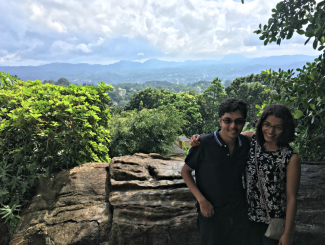
Megha Nagaswami is a junior in the College of Arts and Sciences with a major in Psychology. She is interested in pursuing a career in psychotherapy and clinical research. Thanks to a generous grant from Rajiv Kanishka De Silva, Megha was able to join the SAC Summer Research Internship Program in Kandy, Sri Lanka. Here is what Megha had to say about her experience working with the International Centre for Ethnic Studies (ICES).
"We just got funding for you to travel to Sri Lanka!” I was not prepared to see this email in my inbox on a Friday in late May, but thus began the amazing adventure that was my summer. I had expected to spend a relatively ordinary summer working in a lab on Penn’s campus, but the universe had other plans, and a week after I opened this email and with an express-delivered Sri Lankan visa in hand, I was off to South Asia.
This past summer, I had the amazing opportunity to travel to Kandy, Sri Lanka for a research internship. I was an intern in the International Center for Ethnic Studies (ICES), a research organization that strives to broaden people’s understanding of ethnicity, gender, and conflict. Naturally, I was apprehensive to embark on this adventure- I had never traveled alone internationally, and had never even considered interning abroad. However, I am infinitely glad I left my comfort zone and boarded that plane to Sri Lanka, because this summer was one of the most enriching of my life.
The first project that I worked on, along with fellow interns at the ICES, was to assist with a post-war reconstruction study that was being researched by commission from the World Bank. Sri Lanka has only recently ended a decades-long civil war, and the rebuilding process is still ongoing. As part of this project, the ICES research team (which I had now joined!) traveled to the Northern and Eastern provinces of Sri Lanka. We hosted meetings in each district of each province in the North and East (eight total), where key members of society, such as civil servants, were invited to participate. The goal of these meetings was to learn about community perspectives of the rebuilding process. Where did citizens think the rebuilding process needed to begin? What sorts of problems and challenges were they still experiencing? As a psychology major, I was especially struck by the psychosocial challenges that community members brought up. Depression and alcoholism are two disorders that I have been exposed to in the United States, but to learn about them in a new cultural context was especially profound.
After we returned from our cross country travels, I was eager to learn more about the types of mental health services that are available in Sri Lanka itself. This fascination led to my primary research project: a qualitative assessment of the state of mental health services in Sri Lanka. I spoke with professors, clinical psychologists, psychiatrists, and other types of mental health workers. I was most interested in learning their opinions about the mental health infrastructure itself. Did mental health workers feel that there is a collaborative network? Do they find it easy to network with others in their field? Unsurprisingly, the answer was no. There seem to be many underlying causes, but lack of funding and education were constantly brought to the forefront.
I was inspired to continue my research endeavors in Sri Lanka, and recently submitted a research proposal to conduct my own independent research study. I am passionate about the application of cultural competency and context in the field of mental health, and want to explore this further in Sri Lanka. Religion is a fundamental part of identity for the majority of Sri Lankans, and I hypothesize that this religiosity influences people’s perceptions about mental health and treatment.
I had an amazing experience living with a host family: my host parents truly treated me like their daughter…although they certainly spoiled me much more than my own parents currently do. Living with a Tamil Muslim family offered a very unique perspective to living in Sri Lanka, as this is a minority population in the country. Through everyday conversations, I learned an incredible amount about Sri Lanka’s history and culture.
Intellectually, I was able to add a brand new dimension to my mental health education. Learning about mental health in a brand new cultural context is incredible eye-opening. It was so apparent that transposing a traditionally Western brand of mental health treatment simply is not compatible with the culture and society of a South Asian nation. Sri Lankan psychologists today are working to remedy this, with assessment tools and measures that are actually pertinent to their cultures. As I study psychology in an American university, it can be easy for me to forget that clinical psychology can not and should not look the same in all nations. This trip truly inspired me to think more critically about mental health services, and how they can be most effectively utilized in various contexts.
From a personal standpoint, this summer challenged me mentally and gave me an extraordinary amount of self-growth. I realized just how passionate I am about making mental health services accessible to all populations, and solidified my intentions to pursue clinical psychology. Although I have traveled to South Asia before, I never thought deeply about the cultural context of South Asia, and its interplay with mental health.
This experience has absolutely transformed my views about mental health treatment, and I would recommend this program to any future students who are ready to broaden their world view!"
